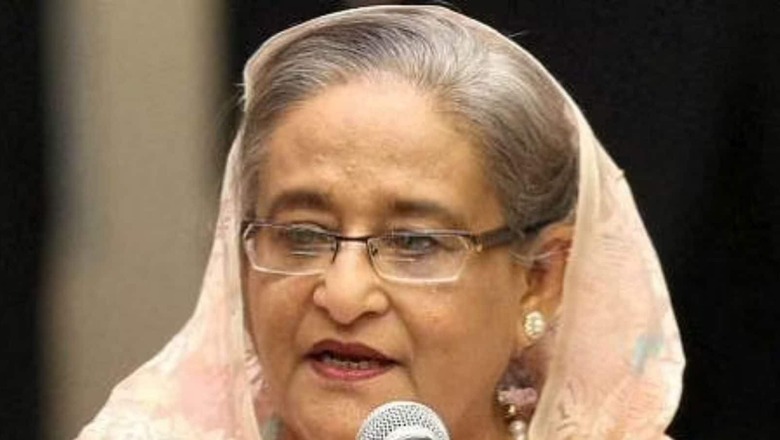
views
On December 16, 1971, Pakistani soldiers surrendered to a joint India-Bangladesh force and Bangladesh was born. Bangladesh entered the comity of nations under the leadership of Sheikh Mujibur Rehman (known as Mujib) and his Awami League party as a secular democracy with sharp curbs on Islamist politics.
But these defining features were ephemeral. With the passing of five decades, the prospects for a secular Bangladeshi democracy seem ever-more remote despite the country’s important strides in human development and contributions to international security. This may be a time to ask why Bangladesh’s secular democracy is likely to remain a dream deferred for the relevant future.
Elusive Consensus
The Awami League contested the 1970 election on Mujib’s so-called “Six Point Programme,” which articulated such demands. The Awami League easily won a robust majority of seats in Parliament which would position it to determine Pakistan’s constitution in the constituent assembly; however, to pre-empt this outcome, western Pakistani elites refused to let them convene the parliament. By March 1970, Bengalis understood that the west would never treat Bengalis fairly and launched a violent insurrection. The west used Islamist militias, including some who were under the control of the Jamaat-e-Islami, as well as the armed forces to brutally suppress Bengali agitators.
Approximately three million people died in the conflict, and millions more were displaced. Many of the perpetrators of extreme violence were associated with the Jamaat-e-Islami, which aided the Pakistani army to commit atrocities against civilians in East Pakistan. Finally, in December 1971, with critical and extensive military and political Indian assistance, the Bengali freedom fighters (Mukti Bahini) secured an independent Bangladesh.
Contrary to popular opinion, neither the war nor the emergence of Bangladesh was a foregone conclusion. Had a peaceful transfer of power taken place and had the Awami League been able to forge a constitution with greater devolution of power and autonomy for all provinces and institute more inclusive governance structures, many of Pakistan’s contemporary security challenges may have been forestalled, such as the endless and brutal oppression of ethnic Baloch who harbour similar grievances to those of the Bengalis but, because they comprise less than five per cent of Pakistan’s population, lack the demographic or political heft.
Because this did not occur and because the west responded with a brutal military response, Bengalis from all social classes and religious commitments took up arms against the West Pakistan military and their Islamist militant allies in pursuit of freedom.
Despite the broad basis of mobilisation, there was neither debate nor consensus on the post-war nature of the State; rather, the ideological basis of the State was imposed once by Awami League elites after East Pakistan was liberated. Without a consensus on the ideological or philosophical basis of the State, the Awami League government hastily framed the 1972 constitution upon Bengali nationalism, secularism, socialism, and democracy. It did so for several reasons.
First, the Awami League embraced these bases of statehood partly due to accommodate India’s equities. Pakistan came into the international system with a communal ideology which held that Pakistan was the rightful home of South Asia’s Muslims. Pakistan’s national ideology was inimical to India’s own beliefs that it was a secular democracy for persons of all creeds. In considerable measure, Pakistan’s State ideology not only forged a civilisational opposition to India, but it also justified Pakistan’s ill-founded territorial claims to Kashmir.
Second, after the West’s military suppression and its efforts to foist its notion of Islam upon Bengalis, a small group of secular intellectuals and students selected the symbolism of Bangladesh nationalism: A poem by Rabindranath Tagore, purportedly composed after protests against the much-detested 1905 partition of Bengal, as the Bangladesh national song. Third, Mujib remained imprisoned in Pakistan from March 26, 1971 until January 8, 1972, most of the political leaders were still in Calcutta when they began forging the basis of the new state. For these reasons, the exiled leaders tapped into the deep well of Bengali resentment and rejection of Pakistan, including the Two-Nation theory which brought Pakistan into existence.
Finally, due to the collaborationist role that JeI and other Islamist militant groups played in what historians have called the Bengali genocide in East Pakistan, the nascent government banned the organisation which became known as the Bangladesh Jamaat-e-Islami Bangladesh (BJeI). The role of BJeI in atrocities during the war of liberation remains a contentious issue and explains why many Bangladeshis are charry of Islamism generally and BJeI specifically.
There was no referendum to secure citizens’ approval for these bases of the State despite the hurried nature of forging the constitution and the lack of national consensus on the lineaments and foundations of the document and the State despite contemporary concerns about this notion of secularism as a State principle. This would prove to be an important mistake: for most of the citizens of this new Bangladesh, Islam had formed the basis of their identity for hundreds of years. Those who picked up arms against the Pakistani army did not do so to forge a socialist, secular society that downplayed the importance of Islam in the identities of East Bengali Muslims.
Even while secularism, dharmo niropekhkhota (religiously neutral), was being promoted by Mujib and his Awami League, religious groups including the reviled BJeI opposed it arguing that it was in fact dharmohinata, or non-religious. In effort to allay some of these concerns, in 1972, Mujib explained to parliament that “Secularism [dharma niropekhkhata] does not mean absence of religion. Muslims will observe their religion and nobody in this state has the power to prevent that. Hindus will observe their religion and nobody has the power to prevent that. Buddhists and Christians will observe their respective religions and nobody can prevent that. Our only objection is that nobody will be allowed to use religion as a political weapon.” In other words, secularism in Bangladesh in this period was best understood as a multi-theocracy.
Despite being the party that birthed Bangladesh, the Awami League’s popularity was short-lived because it was unable to contend with corruption, slow economic growth, and general incompetence. Corrupt elections in 1973, a fragmented opposition movement, complicit legislators, and the presence of an elite paramilitary force called Jatiya Rakkhi Bahini allowed the AL to remain in power despite declining support for the AL and the secular values it claimed to espouse. Over time, the resurgent importance of Bangladeshis’ personal identity as Muslim made it difficult for the government to maintain its commitment to secularism. As Dina Siddiqi observes, while secularism allowed citizens to separate their identities as Bangladeshis, distinct from Bengalis in India, on the one hand and as Muslims on the other, it did not eliminate the importance of personal faith, and openly criticising Islam was politically unpopular.
ALSO READ | A Year after India Won 1971 War, 600 POWs Finally Left Lyallpur Jail in Pakistan for Home
Islam Returns to the State
The role of Islam deepened as Mujib sought to secure the support of other Muslim countries, the majority of which warily viewed the Bengali freedom effort as an effort to destroy Pakistan and divide the Muslim world. Mujib needed this external assistance to help develop Bangladesh’s flagging economy and to prop up his legitimacy at home. In 1973, Mujib mustered considerable efforts during a meeting of the Non-Alignment Movement in Algiers to obtain formal recognition and eventual support of several Arab countries. His efforts to emplace Bangladesh in the comity of Islamic states further fructified when Bangladesh was included in the Organisation of the Islamic Conference and participated in its second summit in Lahore (Pakistan) in 1974.
While support of Saudi Arabia remained elusive, by the eve of the summit Bangladesh was recognised by Pakistan, Iran, Turkey. Despite the efforts of some Bangladeshi politicians to firmly embed secularism in Bangladeshi society and systems of education, Bangladeshis increasingly viewed secularism as being synonymous with dishonouring Islam and tantamount to dependence upon India.
Mujib was assassinated during an August 1975 military coup. Khandakar Moshtaque Ahmed became president for less than three months before a countercoup brought Major General Ziaur Rahman (usually called Ziaur) to power in late 1975. He remained in power until 1981. Under his tenure, Bangladesh’s external ties to Arab Gulf states intensified. To establish more productive ties with Muslim states and to woo Saudi Arabia, Ziaur made crucial constitutional changes. He inserted a clause into Article 25 of the 1972 constitution that formally stated Bangladesh’s solidarity with other Muslim countries. He eviscerated the country’s secular orientation by replacing the commitment to secularism in the Constitution’s preamble with the words “absolute trust and faith in the Almighty Allah”.
In 1978, Zia sought to bolster his government’s legitimacy by founding the Bangladesh Nationalist Party (BNP) as an alternative to the AL. The BNP promoted Bangladeshi nationalism, which was “explicitly Islamic in character,” instead of the secular Bengali nationalism favoured by the AL. However, the BNP lacked both ideological clarity and unity. Instead, it was born largely out of what Siddiqi calls “the politics of grievance”: Its followers had little in common except a strong opposition to the AL. Nonetheless, the BNP became enormously influential in Bangladesh. The AL and the BNP have been fierce rivals ever since.
Between 1976 and 1979, Ziaur also legalised religious political parties and allowed the Islamists who had worked with the Pakistani Army during the liberation war to participate in government again. BJeI was able to publicly re-join Bangladeshi politics in 1979. The changes were part of a strategy to win political popularity by appealing to Islam. Thus, while Ziaur’s efforts to appear less corrupt and more legitimate failed, he did facilitate the growth of more radical Islamist groups in the country. By the time Ziaur was assassinated in 1981, reliance on Islam to build nationalism and bolster the government’s legitimacy was commonplace.
General Hussain Muhammad Ershad (Ershad), Bangladesh’ second military dictator who was in power from 1982 until 1990, continued consolidating Bangladesh’s ties with Muslim countries and extended Ziaur’s project of embedding Islam in Bangladesh’s governance. Most importantly, declared Islam as Bangladesh’s state religion and denervated BJeI as a legitimate political actor.
Ershad even appointed two war criminals from the BJeI (Abdul Mannan and Salahuddin Quader Chowdhury) to cabinet positions. From the eras of Mujib to Ershad, association with the BJeI did not just grant political legitimacy — it also made it easier to obtain aid from oil-rich Middle Eastern countries, which both assisted Bangladesh financially through aid and expatriate labour opportunities but also financed new mosques and madrasas and other Islamic social institutions that expanded the presence of Islam in everyday life.
A popular uprising toppled Ershad’s military government in 1990, and democracy replaced 15 years of military rule. Although the leaders of the AL and the BNP had temporarily united with each other and some Islamist parties to bring Ershad down, the fissures between AL and the BNP quickly re-emerged. By 1991, the AL and the BNP were the two main political parties in newly democratic Bangladesh. They remained intense rivals and their duelling ideologies turned vitriolic. The BNP was victorious in the 1991 elections. Unfortunately, the chasm between the religious Bangladeshi nationalism propounded by the BNP and the secular Bengali nationalism espoused by the AL widened in subsequent years. Both parties boycotted parliament at different times to undermine the elected government of the competition, turning to what Siddiqi calls “violence and extra-legal means” to assert themselves.
Since 1990, Bangladesh’s civil societies and political actors have struggled to define the role of Islam within the polity and the State, with proponents of secularism pitted against those who want to see greater formalisation of Islam in state and society. With the country divided along party lines and with neither able to win an election without coalitions, the BJeI arbitraged its power as a king marker. This was in evidence during Prime Minister Khaleda Zia’s bid for her second tenure as Prime Minister when she aligned with the BJeI to secure adequate seats to form the government. In return, BJeI garnered two cabinet positions, even though it only won 17 seats out of the 350-seat body and garnered a meagre 4.28 per cent of the vote. It was also during Zia’s tenure that Bangladesh experienced widespread Islamist terrorism. Many Bangladeshis believe that her reliance upon Islamist parties like the BJeI explains her unwillingness to take on emergent Islamist terrorism in the country.
Secularism Meets Ground Realities of South Asia
Sheikh Hasina and her Awami League won the 2008 general election with an absolute majority due in large measure to the widespread antipathy towards the BNP-BJeI government and the rein of Islamist terror it ushered. Hasina began to take steps to fulfil several electoral promises. One of her manifesto pledges was the prosecution of war criminals from the 1971 war. In 2009, her government revivified a procedure in the 1973 constitution for prosecuting war criminals, which became known as the International Crimes Tribunal. Hasina has been accused of using the tribunal as an effective way to eliminate her political foes as she consolidates one-woman rule over the country.
In 2011, the supreme court ruled that General Zia’s controversial fifth amendment and General Ershad’s eighth are unconstitutional and void, restoring the 1972 constitution’s four basic principles of democracy, nationalism, socialism, and secularism. However, Hasina approved a bill that sought to retain “Islam as the State religion” and the phrase “Bismillahir Rahmanir Rahimm,” over the objection of two ministers who opposed this move on the simple argument that retaining them was in violent opposition to the principle of secularism. Hasina defended her decision to retain these two provisions on the basis of “ground reality”.
Despite Hasina’s recent vague promises of returning to Bangladesh’s 1972, critics are dubious that she will do so precisely because of these ground realities.
The most public victims of Bangladesh’ repudiation of its own commitments to secularism and democracy have been the Bangladeshi Hindus as well as secular Muslims, Ahmedis, homosexuals and even Sufis. In this sense Bangladesh seems to be following a similar path pursued by Pakistan. Following the most recent outrages against Bangladesh’s beleaguered Hindus in October, Hasina sought to reassure Bangladeshi Hindus that “This land belongs to you; you have your rights. Don’t consider yourselves as minorities; you should have this confidence.”
Since 2013, there have been 3,700 attacks on Hindus — all under her watch. More importantly, the culprits are never brought to justice despite Hasina’s repeated promises to do so.
ALSO READ | Swarnim Vijay Diwas: The Officers Who Won India a Decisive Victory against Pakistan in 1971
Perhaps the most honest thing Hasina has said on this issue was uttered on October 14 while felicitating Bangladeshi Hindus on the occasion of the Durga Puja: “You all know that those who came to power in our country after 1975 used religion to divide people… The rise of global terrorism also has had its impact on our country. Countering this is not only our responsibility, and neighbouring countries like India should also remain vigilant… India did help us in the liberation war (of 1971) and we will remain ever grateful for the support… But they (India) have to be aware that such incidents should not take place there which would have an impact on Bangladesh, and the Hindus in our country face attacks.”
Hasina isn’t incorrect. How can anyone reasonably expect Bangladesh to remain a bastion of secularism in a region in which secularism has been slowly but surely strangled by the long and potent tentacles of religious nationalism?
Christine Fair is a professor of Security Studies at Georgetown University. She is the author of ‘In Their Own Words: Understanding the Lashkar-e-Tayyaba’ and ‘Fighting to the End: The Pakistan Army’s Way of War’. She tweets @cchristinefair. Her website is christinefair.net. The views expressed in this article are those of the author and do not represent the stand of this publication.
Read all the Latest Opinions here



















Comments
0 comment